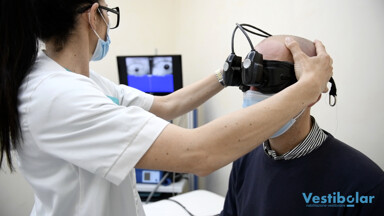A hi-tech “gym” to overcome dizziness e loss of balance, disorders that every year affect “at least 20-30% of the Italian population“. Not only elderly people, but also men and women of all ages affected by pathologies of the vestibular system – the cavity of the ear labyrinth between the eardrum case, the cochlea and the semicircular canals – or undergoing major operations in this delicate area, indispensable contribution to support the body in the elaboration of spatial sensitivity and in the preservation of balance. Identifying the specific causes of the disorder and helping patients to “stand on their feet again” are the goals of Vestibular, new diagnosis and rehabilitation center of the Otological Group of the Piacenza Nursing Home, «An open door to the future of medicine».
Inaugurated in April 2021 in the headquarters in via Morigi, Vestibolar – explain the representatives – to date it has already welcomed a hundred patients, arriving from all over Italy and also from Switzerland for “the innovative treatment based on an evidence-based approach”, or rather on evidence or evidence of efficacy. An environment ad high tech – equipped with treadmills, sensors, monitoring systems and different interactive devices – designed to re-educate the deficits of the apparatus through simulations and gradual training programs structured ad hoc on the diagnosis of the patient, with the possibility of carrying them out even at home, with the support of a tablet. Exercises led by the five otolaryngology specialists, including researchers and physiotherapists, working in the new center, a team awaiting the arrival of a sixth professional, awarded the “Guidetti Prize” at the National Congress of Vestibology in Padua on 29 October last.
The foundation of the project is the medical-scientific research carried out at an international level, over the last five years, on the vestibular system, from which the center itself takes its name; studies that have paved the way for the realization of this new therapy – developed by two start-ups with the Otological Group – for the resolution of the many deficiencies connected to the apparatus, which can present with dizziness, oscillopsia – sensation of oscillation of the fixed objects with the gaze – loss of balance and physical coordination, as well as with phenomena of imbalance.
“A very important ailment,” emphasizes the doctor Anna Lisa Giannuzzi, scientific director of Vestibolar: «Anyone of my colleagues dealing with this type of patient knows how much the relationship between instability, vertigo and anxiety-depressive disorders are interrelated. This is normal, because a situation of imbalance certainly leads to a limitation of what are the social and work activities, leading the patient to be depressed ». Conditions “much more frequent than people usually think,” he specifies. “We know that they affect at least 20-30% of the Italian population annually and that they represent the 4% of accesses to the emergency room, without forgetting how important health care costs are for this type of patient: about 25% of disability pensions disbursed are linked to instability and vertigo ».
The causes? «The main one is benign paroxysmal positional vertigo, certainly the most frequent. They are the famous otoliths, those “pebbles”, as the patients say, which moving in the semicircular canals, determine the sensation of the rotation of the room around us. Then the ear pathologies – continues Giannuzzi – or of the ponto-cerebellar angle (bony duct where the passage of the acoustic nerve takes place), thevestibular migraine and Meniére’s syndrome, extremely debilitating for patients, as it can create long-lasting acute dizzying crises ». Persistent Perceptual Postural Dizziness (PPPD), “a recently introduced pathology with also a phobic component of the patient” underlines Giannuzzi, as well as “traumas that can affect the organ of equilibrium, ototoxic drugs and ear surgery, the same used to treat vertigo can leave instability. ” 
“Many of our patients have previously been operated on for cancers, especially acoustic neuroma – explains the doctor. Victory Sykopetrites, Vestibolar researcher – but there are also many elderly people, both men and women, whose balance problem is linked to age: they gradually lose their hearing and then begin to “work” less and less and with them we focus the work too on the cognitive aspect “. Among the subjects treated in recent months also people with congenital malformation and a young woman with psycho-motor retardation: “Rehabilitation – concludes the vestibologist Elisabetta Rebecchi – it also helps in these cases, as well as in children with attention disorders, other possibilities of application that we hope to further expand in the next period “.
.
